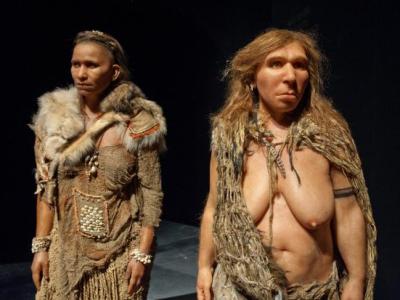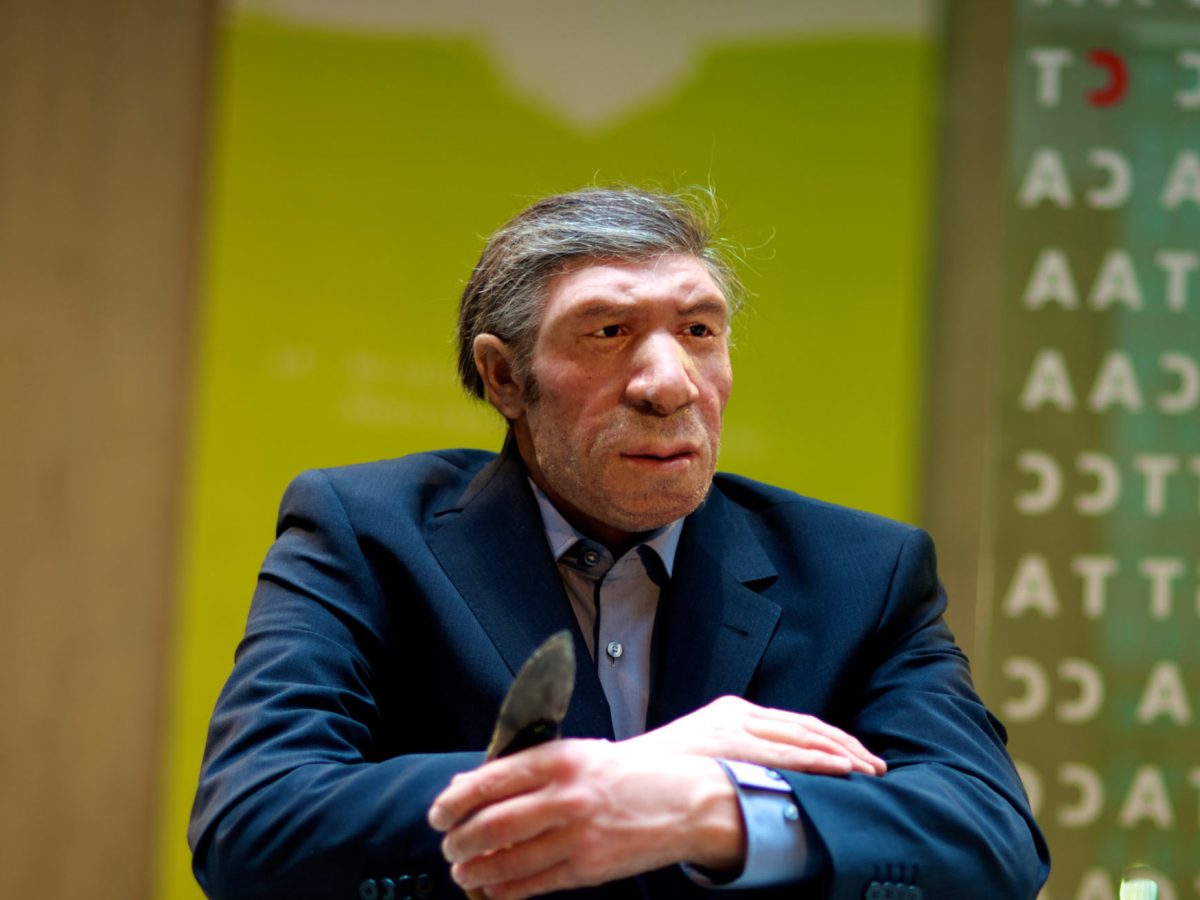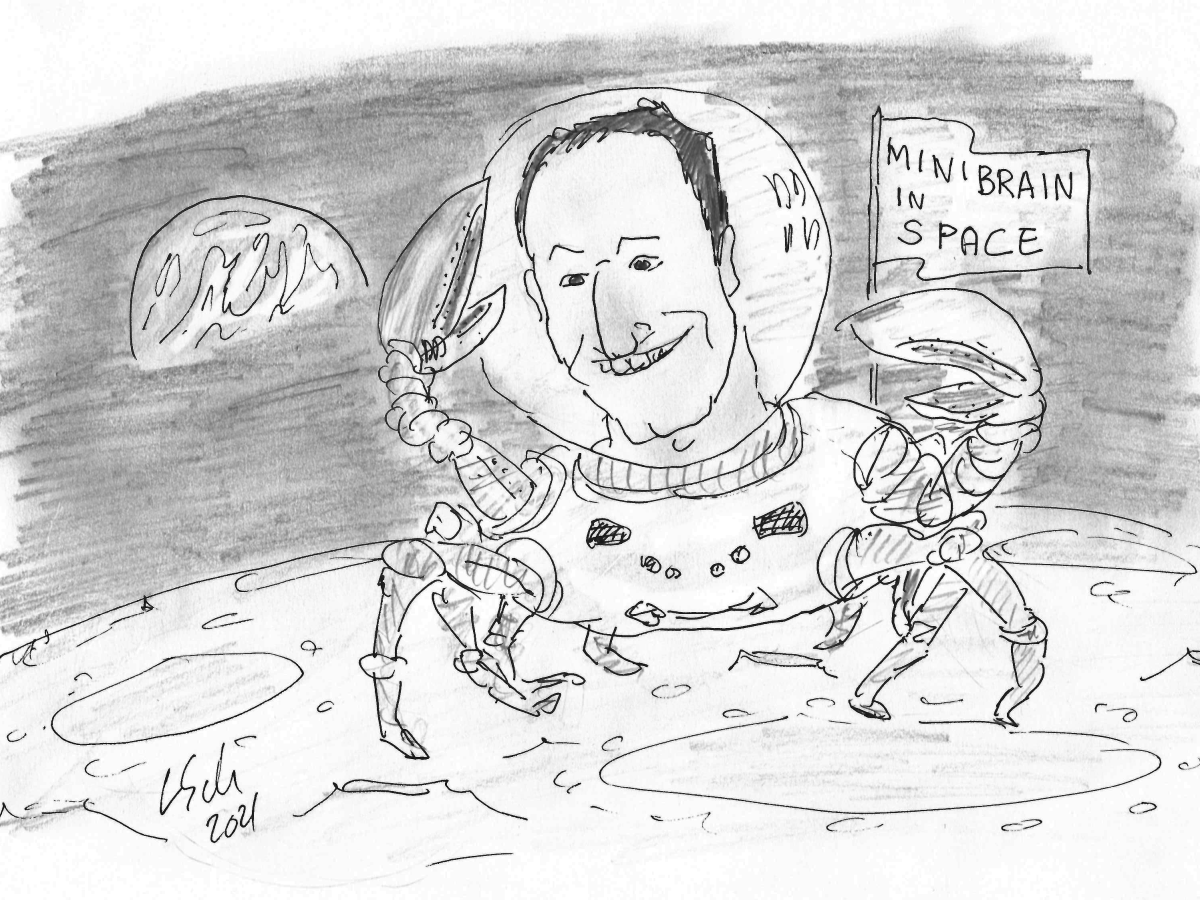The 2022 Nobel Prize in Physiology or Medicine has been awarded to the Swedish geneticist Svante Pääbo, founding director of the Max Planck Institute (MPI) for Evolutionary Anthropology in Leipzig, Germany. The Nobel Prize committee awarded Pääbo
“for his discoveries concerning the genomes of extinct hominins and human evolution“
“Through his pioneering research, Svante Pääbo accomplished something seemingly impossible: sequencing the genome of the Neanderthal, an extinct relative of present-day humans. He also made the sensational discovery of a previously unknown hominin, Denisova. Importantly, Pääbo also found that gene transfer had occurred from these now extinct hominins to Homo sapiens following the migration out of Africa around 70,000 years ago. This ancient flow of genes to present-day humans has physiological relevance today, for example affecting how our immune system reacts to infections.
Pääbo’s seminal research gave rise to an entirely new scientific discipline; paleogenomics.”
Obviously Pääbo was the only scientist who established paleogenomics, or the Nobel committee wouldn’t have made it a one-man-award. OK, whatever, it was always the main point of criticism of the Nobels that science is actually a collective enterprise, breakthroughs are achieved communally, and not the stroke of genius of one single man. Not of a woman, those hardly ever get the Nobel.
Old known Nobel problems. But the award for Pääbo raises other concerns. Like this accusation publicly raised by the science journalist Michael Balter, who specialises on uncovering scandals of MeTooSTEM, bullying and harassment in anthropology.
Balter tweeted:
“I have little doubt Svante Pääbo deserves the Nobel for his scientific work, although he could have shared it with several other researchers. His long years of abuse of students and colleagues, however, well known to many, are another matter. #Harassment #Bullying […]
The victims have been obliged to keep silent all these years. So others have to speak out for them. […]
No, this has never been published. I am referring to it now because the awarding of the Nobel Prize makes it relevant and important. But if you talk to people in anthropology and paleogenomics, many will have heard about it.“
I contacted the Max Planck Society (MPG) for a comment. The press speaker wrote to me:
“Mr Balter shall stop with his unspeakable crude allegations“
She added:
“No reports of complaints against Mr. Pääbo have been received by the MPG registration offices.“
But Balter insists the allegations of harassment and bullying are not his (he gave me some details and hinted that the Max Planck Society knew, although informally). Pääbo did not reply to my email.
In this light, one wonders how a former PhD student of Pääbo, the Australian Alan Cooper, could establish a stellar career in anthropology despite his being a sadistic bully psychopath who also happened to have engaged in research fraud. Even after he was exposed and sacked, Cooper managed to triumphantly return, thanks to the massive support of some bigwigs in the academic community (read here).
Neanderthals abused to support bully Alan Cooper
The journal Science and the anthropology community manage an amazing feat of celebrating bullying, harassment and bad science while urinating upon Douglas Adams’ grave.
I can’t dwell on Balter’s accusations, but I would like to talk about the direction of Pääbo’s more recent research.
Pääbo did what Nobel Prize laureates usually do AFTER they get the Nobel: publishing silly science, which is described as Nobel Disease or Nobelitis. Like the German DKFZ institute director Harald zur Hausen with his mysterious cancer-causing DNA agents in milk and beef. But Pääbo went funny long before the Nobel ceremony, and yet nobody laughed. Even before his Nobel the Max Planck director was so extremely powerful in the genetics and paleogenomics research community, that nobody, including editors and reviewers of elite journals, dared to say a word. Certainly not in public.
Nobelist Harald zur Hausen and the Scamferences
Smut Clyde tells you about some abysmally bad scamferences and the kind of scholars frequenting them, and I explain why Nobel Prize winner Harald zur Hausen is one of them.
For example, that immune system bit mentioned in the press release. I guess the Nobel Committee refers to how Pääbo solved the immuno-genetics of COVID-19. By finding the responsible Neanderthal genes to explain why the pandemic struck India so badly (read here).
It was published in Nature in September 2020 (the preprint appeared already in June 2020):
Hugo Zeberg, Svante Pääbo The major genetic risk factor for severe COVID-19 is inherited from Neanderthals Nature (2020) doi: 10.1038/s41586-020-2818-3
The other author of that Nature study is Pääbo’s mentee Hugo Zeberg, now at Karolinska Institutet in Sweden. This is the institution which issues the Nobel Prize in Physiology or Medicine.
Dirty diseased Neanderthals
Who brought us COVID-19? The Neanderthals. The susceptibility to the SARS-CoV2 coronavirus, but also to diabetes, obesity, allergies, skin diseases, smoking and autism all happened because your great-[…]-great-grandfather could not keep his todger in his trousers many thousands of years ago.
Zeberg and Pääbo compared “the DNA of very sick Covid-19 patients with that of Neanderthals and their mysterious sister group, the Denisovans”, as The Guardian explains. Lo and behold: “I almost fell off my chair because the segment of DNA was exactly the same as in the Neanderthal genome”, Zeberg told the British newspaper.
There was also the official press release provided by the Max Planck Society:
“It turns out that this gene variant was inherited by modern humans from the Neandertals when they interbred some 60,000 years ago,” says Hugo Zeberg. “Today, the people who inherited this gene variant are three times more likely to need artificial ventilation if they are infected by the novel coronavirus Sars-CoV-2.” […]
“It is striking that the genetic heritage from the Neandertals has such tragic consequences during the current pandemic. Why this is must now be investigated as quickly as possible,” says Svante Pääbo, director at the Max Planck Institute for Evolutionary Anthropology. […]
The study also reveals considerable differences in how common this genetic risk variant is in different parts of the world. It is particularly common among people in South Asia where about half of the population carry the Neandertal risk variant. In Europe, one in six people carry the risk variant, while in Africa and East Asia it is almost non-existent.””
Now we know that all ethnic groups are equally susceptible to COVID-19, and it’s the socio-economic and political factors which determined the national death rates. But back then in late 2020, the world could lean back and not worry about supplying vaccines to Africa. The Black people of Sub-Saharan origin are basically immune anyway, free from Neanderthal risk genes, science has spoken.
Soon after, in January 2021, Pääbo and Zeberg claimed in another elite journal that Neanderthal genes PREVENT severe COVID-19, basically the exact opposite message to their earlier paper in Nature. The study was published via the PNAS contributed track by Pääbo, meaning: without independent peer review.
Hugo Zeberg and Svante Pääbo A genomic region associated with protection against severe COVID-19 is inherited from Neandertals PNAS (2021) doi: 10.1073/pnas.2026309118
Pääbo explained in a Karolinska press release:
“It is striking that this Neandertal gene variant has become so common in many parts of the world. This suggests that it has been favourable in the past […] It is also striking that two genetic variants inherited from Neandertals influence COVID-19 outcomes in opposite directions. Their immune system obviously influences us in both positive and negative ways today.”
Thing is, if Pääbo combined these opposite findings into one paper, it would have been unpublishable in an elite journal for lack of significance and physiological relevance, i.e. for being pointless. But now he got the Nobel from the same Karolinska Institutet for exactly that.
It’s quite simple now actually. If you ended up on respirator or even died from COVID-19, that’s because you carry Neanderthal genes. If you only had a mild cough, that was also because you carry Neanderthal genes. But the silliness and occasional inappropriateness of Pääbo’s research doesn’t end there.
This study by Pääbo and Zeberg utterly incidentally and unintentionally baits toxic racist theories about how Black people don’t feel pain as the whites do.
Hugo Zeberg, Michael Dannemann, Kristoffer Sahlholm, Kristin Tsuo, Tomislav Maricic, Victor Wiebe, Wulf Hevers, Hugh P.C. Robinson, Janet Kelso, Svante Pääbo A Neanderthal Sodium Channel Increases Pain Sensitivity in Present-Day Humans Current Biology (2020) doi: 10.1016/j.cub.2020.06.045
Zeberg and Pääbo discovered a gene variant which they say made Neanderthals more pain-sensitive than modern humans who just arrived from Africa. The Max Planck Society issued a press release:
“On a molecular level, the Neandertal ion channel is more easily activated which may explain why people who inherited it have a lowered pain threshold. “Whether Neandertals experienced more pain is difficult to say because pain is also modulated both in the spinal cord and in the brain”, says Pääbo. “But this work shows that their threshold for initiating pain impulses was lower than in most present-day humans.”
Again, a reminder that Sub-Saharan Africans carry hardly any Neanderthal genes, thus according to the research by Zeberg and Pääbo, they should have a higher pain threshold than Europeans with our gentle Neanderthal pain receptors. As it happens, much of US medicine is based on this exact presumption already, that Black patients feel less pain than whites and should receive less or no pain medication or in fact, medical attention. Luckily, some American doctors and researchers started to oppose this medical racism and its cruel scientism. The studies Sabin & Greenwald 2012 , Meghani et al 2012 and especially Hoffman et al 2016 addressed the problem of racist pain medication, where whites get treated and Blacks get dismissed as whiny, and gathered such quotes from today’s medical students and residents:
“Black people’s nerve endings are less sensitive than white people’s.”
Science is always political. Especially when this science gets venerated with a Nobel Prize.
Year before COVID-19, Pääbo determined that other diseases and addictions are also caused by Neanderthal genes:
Sriram Sankararaman, Swapan Mallick, Michael Dannemann, Kay Prüfer, Janet Kelso, Svante Pääbo, Nick Patterson, and David Reich The landscape of Neandertal ancestry in present-day humans Nature (2014) doi: 10.1038/nature12961
As a Harvard press release announced:
“Remnants of Neanderthal DNA in modern humans are associated with genes affecting type 2 diabetes, Crohn’s disease, lupus, biliary cirrhosis, and smoking behavior.”
One could interpret it in a way that the Black people don’t have the white excuse of their smoking, alcoholism and obesity being forced by their Neanderthal genetics, and therefore Black people are personally to blame. I suspect that is how Pääbo’s Harvard collaborator (and “race realist“) David Reich may indeed be understanding his study. I don’t know how Pääbo understands it, he can explain it at his upcoming Nobel Prize speech maybe.
The anti-social mini-brains of Neanderthals
Neanderthals colonised Europe and Middle East long before modern humans and went extinct less than 30,000 years ago, when our species has spread there. Their story inspired the fantasies of generation of scientists, some of whom still cannot accept the idea that Neanderthals were just another kind of humans very similar or maybe simply just…
Presently, Pääbo is big into the so-called minibrains. Those are much-hyped clumps of stem cell-derived neural cells differentiating in a cell culture dish. The Nobelist’s speciality is to use the CRISPR/CAS9 gene editing technology to make Neanderthal-styled minibrains, a technology he developed with Janet Kelso, her then-postdoc Michael Dannemann, and other researchers of his Max Planck Institute in Leipzig. In 2018, one of them announced in the Guardian:
“You start the organoid growing and leave it for nine months and see what happens,” said Gray Camp, a group leader at the institute who is overseeing the organoid experiments. “You don’t get a well-formed human brain at all, but you see multiple regions have kind of formed; you can study the synapses and electrical activity and early developmental differences.” [..]
“We can regrow your Neanderthal brain,” said Camp. “We can monitor that and resurrect the functionality of those neanderthal genes.”
The Pääbo team succeeded in 2020:
Michael Dannemann, Zhisong He, Christian Heide, Svante Pääbo, Janet Kelso, J. Gray Camp Human Stem Cell Resources Are an Inroad to Neandertal DNA Functions Stem Cell Reports (2020) DOI: 10.1016/j.stemcr.2020.05.018
In a press release Camp was quoted that his minibrains can be used to study Neanderthalian “intestinal tract and digestion, cognition and neural function as well as the immune response to pathogens“.
And the minibrain technology delivered, not just for COVID-19. This very recent paper by Pääbo explained why Neanderthals were so stupid.
Felipe Mora-Bermúdez , Philipp Kanis , Dominik Macak , Jula Peters , Ronald Naumann , Lei Xing , Mihail Sarov , Sylke Winkler , Christina Eugster Oegema , Christiane Haffner , Pauline Wimberger , Stephan Riesenberg , Tomislav Maricic , Wieland B. Huttner , Svante Pääbo Longer metaphase and fewer chromosome segregation errors in modern human than Neanderthal brain development Science Advances (2022) doi: 10.1126/sciadv.abn7702
Pääbo and his colleagues determined the 6 amino acid variations between modern humans and Neanderthals, which must have been decisive for neural cell division and hence intelligence. The team worked with the minibrains to replace the modern human amino acids with the variants of Neanderthals, mice and apes. The paper’s abstract sums up:
“When we introduce these modern human-specific substitutions in mice, three substitutions in two of these proteins, KIF18a and KNL1, cause metaphase prolongation and fewer chromosome segregation errors in apical progenitors of the developing neocortex. Conversely, the ancestral substitutions cause shorter metaphase length and more chromosome segregation errors in human brain organoids, similar to what we find in chimpanzee organoids. These results imply that the fidelity of chromosome segregation during neocortex development improved in modern humans after their divergence from Neanderthals.”
Neanderthals are up there in the trees with other monkeys (and rodents), their feeble-brains failing already at the mitotic interphase level.
Pääbo, who keeps connecting Neanderthal genetics to everything in modern society, seems obsessed with the idea of proving Neanderthals to have been no smarter than chimps. Obviously one draws many millions in research funding and a Nobel Prize on top for this.
Previously Pääbo got help from russia to find the gene which distinguishes modern humans from stupid Neanderthals and other monkeys (it of course has nothing to do with mitosis):
Vita Stepanova , Kaja Ewa Moczulska , Guido N Vacano , Ilia Kurochkin , Xiangchun Ju , Stephan Riesenberg , Dominik Macak , Tomislav Maricic , Linda Dombrowski , Maria Schörnig , Konstantinos Anastassiadis , Oliver Baker , Ronald Naumann , Ekaterina Khrameeva , Anna Vanushkina , Elena Stekolshchikova , Alina Egorova , Anna Tkachev , Randall Mazzarino , Nathan Duval , Dmitri Zubkov, Patrick Giavalisco, Terry G Wilkinson, David Patterson, Philipp Khaitovich, Svante Pääbo Reduced purine biosynthesis in humans after their divergence from Neandertals eLife (2021) doi: 10.7554/elife.58741
The Skolkovo press release explains:
“The team discovered that the modern human genome undergoes mutation which makes the adenylosuccinate lyase enzyme less stable, leading to a decrease in purine synthesis. This mutation did not occur in Neanderthals, so the scientists believe that it affected metabolism in brain tissues and thereby strongly contributed to modern humans evolving into a separate species.”
Collaboration of German institutions with scientists inside the rascist terror state is now banned by German founders. But maybe an exception will be made for the Leipzig Nobelist and his colleagues at Skolkovo? They do such important groundbreaking research together.
Pääbo’s discoveries with Neanderthal minibrains seem silly, but what another minibrain researcher, Alysson Muotri at UC San Diego in USA, publishes, is outright idiotic. Yet it appears not in Frontiers, but in elite journals like Science and Cell, because some very influential peers approve of it.
Alysson Muotri, a minibrain
Autistic Neanderthal minibrains operating crab robots via brain waves of newborn babies are to be launched into outer space for the purpose of interstellar colonization. No, I am not insane. Science Has Spoken.
For example, when Muotri claimed in 2021 in Science to have discovered the gene for autism (NOVA1) which he CRISPRed into minibrains to make them shrivelled, i.e. both autistic and Neanderthal (Muotri insists Neanderthals were all autistic), Pääbo was quoted:
“It is amazing that by changing a single amino acid in a single protein, one creates an effect that is visible even in how the organoids look in the microscope,”
If we hypothesise for a moment that the new Nobel Prize winner, his Leipzig subordinates and his internationally dispersed academic progeny were the people positively peer-reviewing Muotri’s idiocies… Gosh, what amazing science breakthroughs await us now from Pääbo’s Leipzig lab and the labs of his protégés?
Brace yourself. Pääbo now has to beat his past pre-Nobel Nobelitis.
Note: much of the above material was published before on For Better Science
I thank all my donors for supporting my journalism. You can be one of them!
Make a one-time donation:
I thank all my donors for supporting my journalism. You can be one of them!
Make a monthly donation:
Choose an amount
Or enter a custom amount
Your contribution is appreciated.
Your contribution is appreciated.
DonateDonate monthly






This is one of the most embarrassing Noble Price decisions in Physiology and Medicine ever. I wonder if there are any Neanderthal-genes for severe Nobelitis?
LikeLike
Underwhelming “science”.
I thought most pople had accepted evolution applied to humans too years ago.
How is human evolution any different to evolution of any other species?
LikeLike
The last 40 years in the history of scientific research made the Nobel prizes totally not credible and completely ridiculous. Nowadays is not a nice thing to get a Nobel prize. Much more the opposite is true.
LikeLike